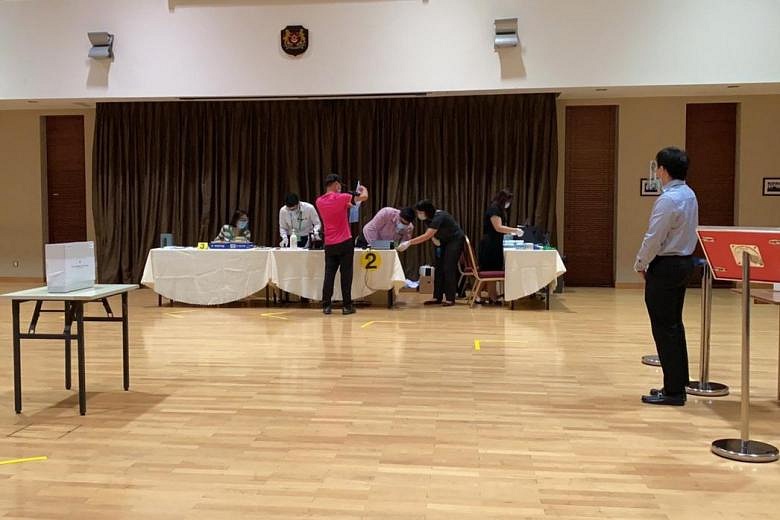BEIJING - Singaporeans in Beijing headed to the polls on Friday morning (July 10), casting their vote at the Singapore Embassy in the Chinese capital.
A small queue of four - albeit with social distancing measures - had formed outside the compound by 7.45am, ahead of the 8am start.
First in line was Dr Wang Jun, who works in clinical research. The 43-year-old is a first-time voter and had travelled nearly an hour from his home in Shunyi in east Beijing to the embassy in the city centre.
Business unit manager Desmond Tan, who works in the eyecare industry, said it was his third time voting in Beijing.
"This is the future of our country, who's going to run our country, so that's very important to me," he said.
"Although in the last two elections, (the contest in) my constituency wasn't very close... but if the votes are tight, then every vote will count and I suppose that's when my vote will count against the outcome," he said, declining to reveal his constituency.
Amid a global pandemic with travel restrictions still in place, it has been "particularly challenging" managing an overseas polling station, said Singapore Ambassador to China Lui Tuck Yew.
"Due to Covid-19-related health restrictions, the election officials from Singapore had to arrive in Beijing two weeks before Polling Day to serve out their quarantine," he said, adding that without direct flights between Singapore and Beijing, critical elections material had to be sent via Shanghai, where an embassy staff member was dispatched to pick up the material.
On top of local health requirements, safe distancing measures implemented in Singapore also extend to overseas polling stations, including temperature screenings and for masks to be worn at all times.
Voters also had to sanitise their hands and put on plastic gloves before being handed their ballot papers.
In Beijing, this means that voters have to present their health status through a government-built programme on their mobile phones before being allowed onto embassy grounds.

Beijing is one of 10 foreign missions designated as overseas polling stations. The rest are Canberra, Dubai, Hong Kong, London, New York, San Francisco, Shanghai, Tokyo and Washington.
These are cities with a significant number of Singaporeans.
In Hong Kong, dozens of mask-clad voters were queuing outside the Singapore consulate in Admiralty Centre early Friday morning.
Among them was banker Geraldine Yip, 44, who said the entire process took her about 45 minutes, longer than she expected.
"When I got there at 7.55am, there must have been at least 30 people in front of me," said the Tanjong Pagar constituent.
Asked if she was concerned about having to vote at a time when local transmission of Covid-19 has flared up in the city, Ms Yip expressed confidence that precautionary measures would be built into the process.
Because of the time difference, voters in the United States and Britain got to cast their votes on Thursday.
After polls close at 8pm local time, the ballot boxes will have 10 days to return to Singapore before the votes are tabulated and added to the final count.
According to the Elections Department, there are 6,570 overseas voters in this general election, an increase from the 4,868 registered during the 2015 election.
Additional reporting by Claire Huang


